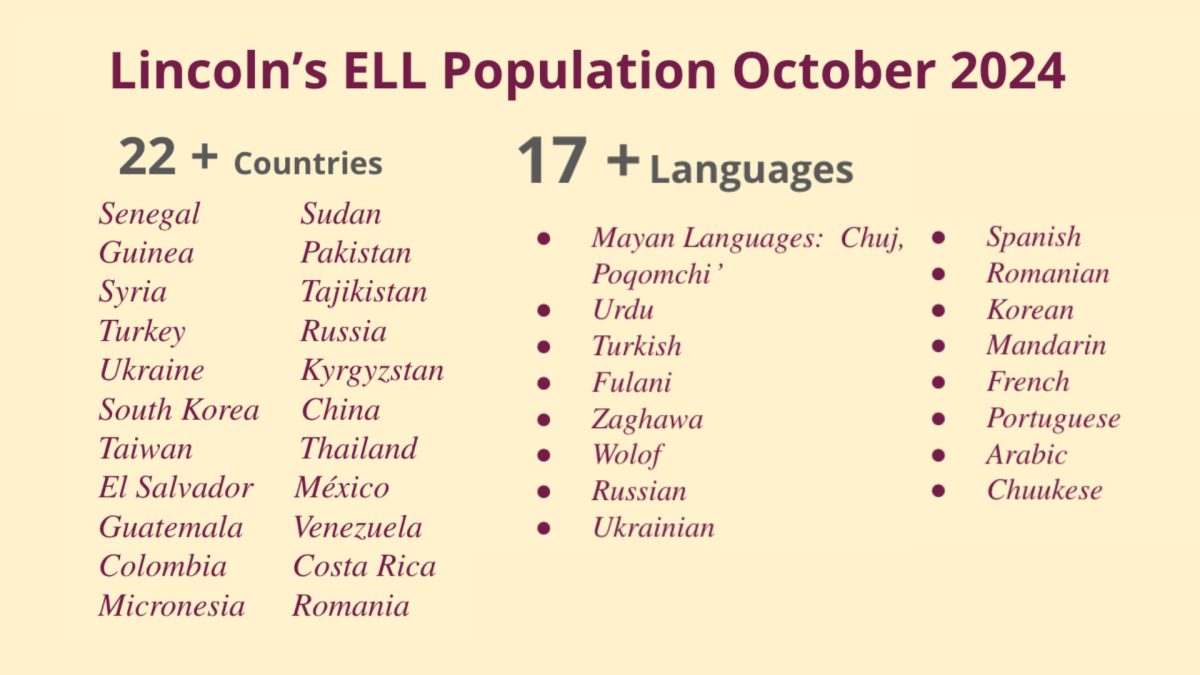English Learning Development (ELD) programs are offered to international students who need support in both learning and improving their English language skills. These programs are often built into public school systems but also operate in the form of after-school academies dedicated to learning English.
Any student who is new to the United States is screened for English proficiency using English Learning Proficiency Assessments (ELPAs) administered by the state. Those who are still developing their skills are enrolled in ELD classes to work on reading, writing, listening and speaking English.
Senior Saif Mohmaed is one of the students in the ELD program. He came to the United States from Sudan at the end of last school year.
“I feel so comfortable here. I am so excited to be here,” said Mohmaed.
Liz Cannon is the lead teacher of the ELD program at Lincoln, and she explained how it works.
Lincoln’s ELD program focuses on English reading, writing, listening and speaking skills. Students in the program take both English development classes and sheltered classes. Sheltered classes are exclusively for ELD students; subjects such as history and math are adapted to the needs of students in the class.
Un-sheltered (or mainstream) classes are classes where the majority of the students are not in the ELD program. These include science and electives, which ELD students take as well.
The program is estimated to take two school years to complete, given that the student has reached the proficiency level to be tested out of it. ELPAs are taken yearly by students to gauge progress in English skills development.
Cannon is in her sixth year of teaching at Lincoln. “I love my job because I love the students so much […] It’s a privilege to know people from other countries,” said Cannon.
Cannon said that adjusting to Lincoln can be a huge challenge for her students. She says it is difficult to learn subject matter, language and culture all at once, and she encourages all Lincoln students to support ELD students in any way they can.
“Slow down and take a look around [. . .] Try to notice the other kids in class who are from a different country or culture and just take a minute to try to have a conversation with them,” said Cannon.
Cannon said many ELD students feel pressured to graduate with the other students in their grade.
In mainstream classes, teachers are expected to adapt their curriculum as needed for accessibility to ELD students.
Cannon said there is a range of experience and attitudes from teachers when it comes to making accommodations for students learning English. Large class sizes can make focusing on ELD students difficult for teachers.
Samuel Ical Icuc has been a student in the ELD program since his sophomore year and has ideas on how to make the ELD program even more successful.
“I think it’s kind of hard work for [Ms. Cannon] to try to help in both languages … If the school can get someone from outside to help or a TA … I think that would be an option,” said Icuc.
He added that affinity spaces, like MEChA, are helpful for ELD students to find community.
Freshman Sol Machado Alvarado, who has been in ELD programs since middle school, feels she is better supported when teachers check in on her.
“I feel better supported when [my teachers] just come to me … and say ‘Hey, I’m missing this and this from you, do you need help with it?’” said Machado Alvarado.
Cannon believes that everyone at Lincoln should be welcoming to all the international students.
“I think sometimes we assume that if someone doesn’t speak our language that there’s not a lot going on behind that … The reality is [students whose primary language is not English] have so much to offer the school and the community, and I hope other people get to hear their stories,” said Cannon.

